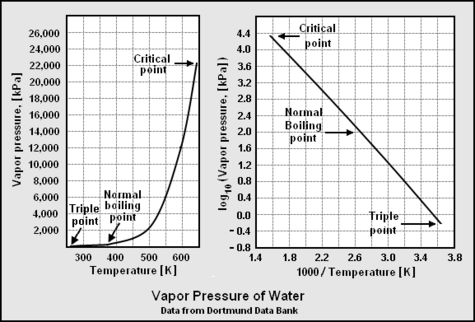User:Milton Beychok/Sandbox: Difference between revisions
imported>Milton Beychok No edit summary |
imported>Milton Beychok No edit summary |
||
| Line 5: | Line 5: | ||
The dew point of a gas mixture is involved with its [[relative humidity]] (RH). A relative humidity of 100% indicates that the gas mixture is at its dew point and saturated with water vapor. A relative humidity of less than 100 % indicates that the gas mixture is not at its dew point and not yet saturated with water vapor. Contrary to the common notion that relative humidity only applies to the atmospheric [[air]], it applies to any gas mixture containing water vapor. | The dew point of a gas mixture is involved with its [[relative humidity]] (RH). A relative humidity of 100% indicates that the gas mixture is at its dew point and saturated with water vapor. A relative humidity of less than 100 % indicates that the gas mixture is not at its dew point and not yet saturated with water vapor. Contrary to the common notion that relative humidity only applies to the atmospheric [[air]], it applies to any gas mixture containing water vapor. | ||
==Determination of the water dewpoint== | |||
Assuming [[ideal gas]] behavior of a gas mixture containing water vapor, from [[Dalton's law]] and the fact that the [[mole fraction]] of a gas component in a gas mixture is equal to the volumetric fraction of that component in a gas mixture, we have: | |||
:<math>p_w = x_w p_t = v_w p_t</math> | |||
Thus, given the total pressure of the gas (<math>p_t</math>) and either the mole fraction (<math>x_w</math>) or volume fraction (<math>v_w</math>) of the water vapor in the gas mixture, the [[partial pressure]] of water vapor (<math>p_w</math>) in the gas mixture can be readily determined with the above equation. | |||
When the partial pressure of water vapor (<math>p_w</math>) in the gas mixture equals the the [[vapor pressure]] of pure liquid water (<math>p_w^o</math>), the gas mixture is saturated with water and is at its water dewpoint (<math>T_d</math>). | |||
There are a number of [[Antoine equation]]s and similar equations that relate the vapor pressure of pure liquid water (<math>p_w^o</math>) to the temperature of the water. One such equation, which is quite accurate, is: | |||
:<math>T = \frac {1668.21}{7.09171 - log_{10}p_w^o} + 45.15</math> | |||
Revision as of 17:21, 7 May 2010
The water dew point (or simply the dew point) of a gas mixture is the temperature, at a given pressure, at which any water vapor in the gas mixture will start to condense into liquid water. The water dew point of a gas mixture, at a given pressure, is often referred to as the point at which the gas mixture is saturated with water vapor (i.e., the gas cannot hold any more water vapor).
The dew point of a gas mixture is involved with its relative humidity (RH). A relative humidity of 100% indicates that the gas mixture is at its dew point and saturated with water vapor. A relative humidity of less than 100 % indicates that the gas mixture is not at its dew point and not yet saturated with water vapor. Contrary to the common notion that relative humidity only applies to the atmospheric air, it applies to any gas mixture containing water vapor.
Determination of the water dewpoint
Assuming ideal gas behavior of a gas mixture containing water vapor, from Dalton's law and the fact that the mole fraction of a gas component in a gas mixture is equal to the volumetric fraction of that component in a gas mixture, we have:
Thus, given the total pressure of the gas () and either the mole fraction () or volume fraction () of the water vapor in the gas mixture, the partial pressure of water vapor () in the gas mixture can be readily determined with the above equation.
When the partial pressure of water vapor () in the gas mixture equals the the vapor pressure of pure liquid water (), the gas mixture is saturated with water and is at its water dewpoint ().
There are a number of Antoine equations and similar equations that relate the vapor pressure of pure liquid water () to the temperature of the water. One such equation, which is quite accurate, is:








